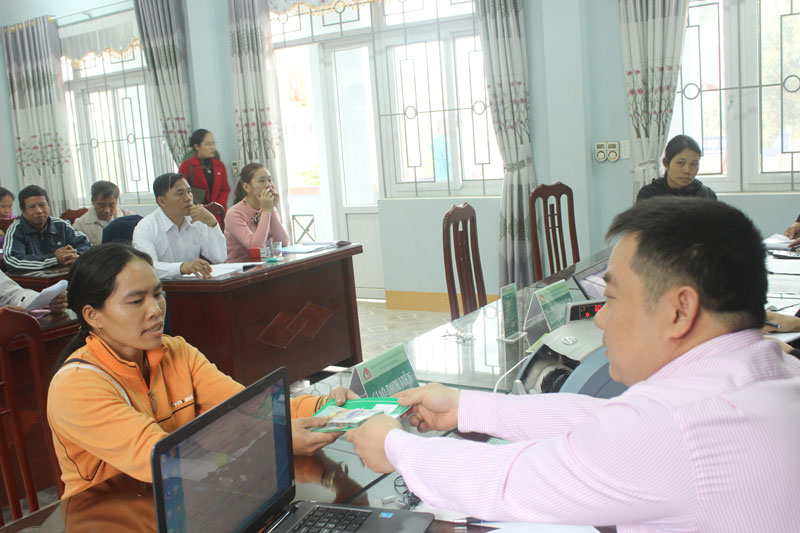
(HBO) – Over the past years, Tong Dau commune (Mai Chau) has been interested in implementing the hunger elimination and poverty reduction. Particularly, thanks to preferential loans of Social Policy Banks, the local people have used the capital for the right purposes with many effective economic models, contributing to increasing the income and improving the people's living conditions. By the end of 2017, the poverty household rate of the commune was 7.3%; the rate of near poor households was 7.8%; the average income per capita reached at 25 million VND.

Ms. Vi Thi Xien, Tong village, Tong Dau
commune (Mai Chau) was given a new loan of 30 million VND from poor households
to invest in raising cows.
Up to now, Tong Dau commune has 11 groups of
savings and loans with 343 members operating in 6 villages. At present, the
commune has implemented 9 policy credit programs with a total outstanding debt
of over 6.4 billion VND, including: programs for poor households, near poor
households, no, poor households, poor households, poor households, poverty
escaping households, clean water and environmental sanitation, production –
business, students – pupils, career solutions, housing issues and ethnic minorities. In particular, the loan program of
clean water and environmental sanitation has the highest debt (over 2.8 billion
VND) with 228 borrowing households; poor households with the debt of over 1
billion VND with 38 borrowing households; the near poor households with the
debt of over 1.2 billion VND with 43 households borrowed, etc. Until March
2018, the savings of the group reached over 300 million VND. In particular, the
commune has no overdue debt; 100% of the groups are ranked at good level.
Mr. Ha Van Tich, the Chairman of Tong Dau
commune People's Committee said: The policy loan program has received the high
agreement, unity of the Party committees, authorities and the local people.
Monthly, the Social Policy Banks transacts at the commune on a fixed date, so
it becomes favorable to conduct the eamination and disbursement loans. Thanks
to loans borrowed and assistance in farming techniques and livestock raising
methods, many households have improved from poverty households to become quite
good ones. In 2017 and the first 3 months of 2018, from the source of policy, the
households have invested in building, repairing and upgrading 82 clean water
projects, 82 sanitation works; building 5 new houses; creating jobs for 7
employees, etc.
In order for the policy capital to be more
effective, contributing to the achievement of sustainable poverty reduction
targets in the commune, in the coming time, all the associations, trustees and
communal authorities closely cooperated with the District Social Policy Bank to
deploy and implement the policy capital. Accordingly, they focus on propaganda,
timely disbursement of capital to the local people. At the same time, they
regularly inspect and supervise to direct the local people to use capital for
the right purposes and efficiency. The task of choosing the poor, near-poor
households for borrowing the loans is focused, oriented without spreading,
giving priority to the households who have enough conditions to the program
beneficiaries, having clear production plans, good management at the capacity
of loans, etc.
The process of selection is in collaboration
with the participation of organizations, associations, village leaders to
ensure that the amount of loans is suitable with the production plan. The
commune expects to supplement the loans to poor households, near poor
households and policy beneficiaries to help those households raise their
production capital, stabilize their life and escape sustainable poverty, and
better serve the poverty reduction task in the commune. – The Commune People's
Committee Chairman stressed.
The Department of Education and Training of Hoa Binh province held a conference on March 18 to review the performance of the "Safe and Happy School" Project and set out tasks for 2025. The project, funded by the Taiwan Fund for Children and Families (TFCF), aims to create a safe, inclusive, and supportive learning environment for students. The event saw the attendance of representatives from the TFCF and 26 beneficiary schools.
With over 70% of their workers being women, trade unions across industrial parks (IPs) in Hoa Binh have been actively safeguarding their legal rights and interests while implementing initiatives to improve their income and well-being.
In recent years, the Hoa Binh provincial General Hospital has continuously innovated itself and improved the quality of medical services to meet the increasing needs of local people. With substantial investments in infrastructure and modern equipment, along with a team of highly qualified doctors and nurses, the hospital has gradually established itself as one of the leading medical units in the Northwestern region and a trusted destination for healthcare for people inside and outside the province.
From mastering the fundamentals of programming to achieving national recognition, the Programming Club of the Le Van Tam Primary School (STAR LVT28) in Hoa Binh city has made remarkable strides in the field of robotics.
The Ho Chi Minh Communist Youth Union Committee and the Vietnam Youth Federation chapter of Hoa Binh province organised a programme on March 12 to launch the "Digital Literacy" movement and an online quiz on the resolutions of the Vietnam Youth Federation congresses at all levels, as well as the Politburo's Resolution No. 57-NQ/TW on breakthroughs in the development of science, technology, innovation, and national digital transformation.
As climate change grows more unpredictable, the development of production forests has become essential - not just for economic growth, but for safeguarding the environment and maintaining ecosystem balance. By boosting local incomes, curbing natural disasters, preventing soil erosion, and protecting water resources, these forests play a crucial role in sustainable development.



